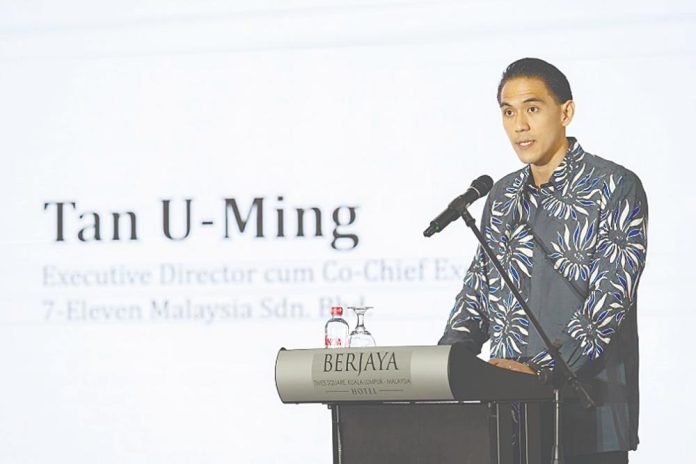KUALA LUMPUR: 7-Eleven Malaysia Holdings Bhd is poised to see higher footfalls this year following a strategic move by Japan-based Seven Bank Ltd to install 100 cash recycling machines (CRM) in 7-Eleven stores this year.
Executive director and co-chief executive officer Tan U-Ming said while Malaysia continues to embrace digital payment methods, the demand for physical cash remains significant, especially in non-urban areas and among certain demographics.
He said factors such as financial inclusion, reliability, and accessibility all contribute to cash’s enduring relevance in Malaysia’s payment landscape.
“Cash continues to play a vital role in the economy and societal structure, serving as a universal and dependable form of payment. We are proud and confident in our joint venture with Seven Bank, which aims to enhance convenience and expand access to financial services.
“This initiative is designed to benefit not only our 7-Eleven customers but also Malaysians nationwide, addressing consumers’ evolving needs while supporting the broader financial ecosystem,“ he said at the launch of Seven Bank’s automated teller machines (ATM) across Malaysia today.
Seven Bank, the banking business of 7-Eleven Group, installed its first CRM in Rawang, Selangor, earlier this month. The bank plans to deploy an initial 100 CRM in 7-Eleven stores throughout Kuala Lumpur, Selangor, Penang and Johor. There are plans for expansion to Sabah and Sarawak in 2026.
The initiative focuses on suburban areas, aiming to provide greater access to banking services for residents with limited options.
Seven Bank holds a majority stake of 50.1% in joint venture company Reachful Malaysia Sdn Bhd (RMSB). Meanwhile, 7-Eleven Services Sdn Bhd owns 24.9%, HQZ Credit, a subsidiary of Berjaya Corporation Bhd, holds 20%, and SMRT Holdings Bhd, listed on Bursa Malaysia, has the remaining 5%.
According to a presentation by RMSB, Malaysia’s robust market dynamics make it an attractive destination for innovative financial solutions. The country presents a strong economic foundation with a growing population of 34.1 million and a gross domestic product growth rate of 5.3% as of the third quarter of 2024.
Additionally, the high currency circulation, the widespread presence of 7-Eleven stores and the increasing reliance on ATM highlight the continued relevance of cash transactions alongside the rising cashless trend.
Furthermore, RMSB data showed that with about 2,600 stores nationwide, 7-Eleven Malaysia plays a pivotal role in enhancing financial accessibility.
The expansion strategy includes advanced CRM installations, offering extended services such as cardless transactions, branding partnerships with banks, and a rewards programme linked to 7-Eleven.
RMSB noted that by integrating retail and financial services, the initiative positions itself as a critical infrastructure supporting Malaysia’s evolving payment landscape.
“We have established a new brand name, Reachful, as a strong start in Malaysia and a continued growth of our overseas business,” Seven Bank president and representative director Masaaki Matsuhashi said.
“By collaborating with our partner companies to deploy ATM services in 7-Eleven stores in Malaysia, we hope to enrich the lives of the Malaysian people and contribute to further social development and economic growth,” he said.
SEM executive director and co-chief executive officer Wong Wai Keong emphasised the importance of leveraging data and customer interactions to gain valuable insights when comes to financial accessibility.
He noted that the company must deepen its understanding through active engagement and meaningful exchanges with its customers.
“Over time, we will need to identify the best sites to be able to deploy the next batches of CRMs. So probably we will have to prioritise in places where it requires more resources. So I think that’s in the work.
“We have, I think, plans are being worked on. I think we will share more of that when the time comes. However, there are plans to easily deploy more of these in stores all the way up to Sabah and Sarawak,“ he said.
Wong said the expectation for the operations of convenience stores is to improve the customer experience by providing a diverse array of services within a single location, including shopping and financial services, accessible even at midnight.
This approach aims to significantly increase foot traffic, which, while beneficial, will also put additional pressure on the stores, he added.








